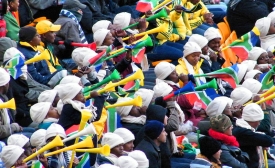nation branding
The recent unrest in Baltimore has impacts far beyond the United States. Reputation matters, and events like those that transpired in Baltimore are a proverbial black eye on the U.S.’s image. More specifically, the impact is on public diplomacy.
While dragons have been the symbol of imperial power for centuries in the Middle Kingdom, its government prefers to use the cuddly panda as a diplomatic gift to project its softer side. The dragon-to-panda transformation is a carefully thought-out image makeover by China’s top leadership: with their rising global power, they understand the need to reassure the world that they are a force for good, more like the panda than the dragon
Yep, the Azeris have oil... huge amounts of the stuff, so much so that the country is the ugly guy made good who’s suddenly never lonely. And Azerbaijan likes it, to the extent it wants to re-brand itself as a cultural, social and economic hot-spot rather than some backwater parked next to the Caspian Sea. And sport is a perfect branding opportunity.
The second area of Turkey’s ethos gap is in relation to the Kurdish question and the confrontations with Armenians and Alevis – longstanding conflicts inherited from the Ottoman Empire. These disputes influence Turkey’s global reputation and challenge the vision of its highly idealistic values-driven foreign policy discourse.
The ongoing Singapore Festival in France and the traveling Singapore: Inside Out campaign are just two veins of Singapore's global cultural outreach, an attempt to promote its cutting-edge artists - and through them, a dynamic Singapore brand - the world over.
![Photo reprinted courtesy Hilmi Hacaloğlu (VOA) [Public domain], via Wikimedia Commons Protests in Turkey after the murder of Özgecan Aslan, February 2015](https://uscpublicdiplomacy.org/sites/default/files/styles/275x168/public/uploads/%C3%96zgecan_Aslan_protests.jpg?itok=1925B9dr)
The conclusion of Senem Cevik's thoughts on Turkish nation branding.

New reseach paper evaluates the impact of the 2010 FIFA World Cup for South Africa's brand identity.
It clarifies Cuba in America's official narrative not as a security threat but a country in transition, which is more in line both with Cuba's own self-image and how Latin American and European countries see it. Such a description undermines any rationality for the embargo and lends itself to a U.S. policy that emphasizes engagement and people to people contacts.







